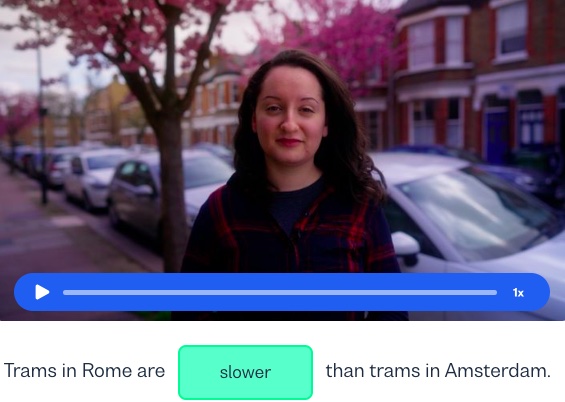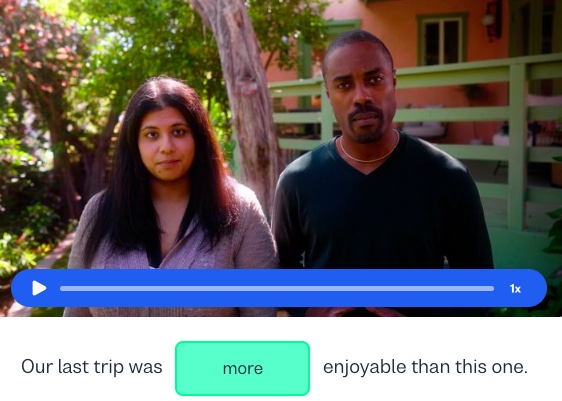The Essential Guide to Comparative Adjectives
Discover how to use comparative adjectives with clear explanations and real-life examples.
I want to learn...
Before booking a trip, it’s pretty common to first take a look at several different travel options to figure out which one ticks all the right boxes. You might enjoy traveling to a ‘bigger’ city with ‘more numerous’ dining and entertainment options. Or maybe, you prefer a ‘more relaxing’ getaway to a place that is a little ‘less popular’ with tourists.
In English, we use comparative adjectives to compare things like travel destinations. In fact, you’ve probably realized we have already used several comparative adjectives in many of our lessons in our English Travel Course.
In this article, we’ll take a deeper look at the usage of comparative adjectives and more importantly, the spelling rules for different kinds of comparative adjectives.
What are comparative adjectives and how do we use them?
The comparative form of adjectives compares two things or people. For example, we can use them to compare two pairs of shoes, two apartments or even our two best friends. In general, we can use comparative adjectives to make two different kinds of comparisons.
- A direct comparison, where we mention both people or things:
Example: New York City is larger than Phoenix.
- An indirect comparison, when it’s not necessary to mention the other person or thing:
Example: Phoenix is less crowded in the summertime than in the winter.
Unfortunately, we can’t use comparatives with all adjectives. Let’s consider the adjective ‘terrible’. Can we say that traffic in New York is ‘more terrible’ than traffic in Phoenix? Not really. This is because terrible is already an extreme adjective, so something cannot be more or less terrible.
General rules for comparative adjectives
In general, with short adjectives (one syllable), we add the suffix ‘-er’ or some variation of it. With long adjectives (two or more syllables), we add the words ‘more’ or ‘less’ before the adjective.
Let’s break this down further with the spelling rules for different kinds of one- and two-syllable adjectives.
Spelling rules for one- and two-syllable adjectives
| Rule | Structure | Example |
|---|---|---|
| Most (one-syllable) adjectives | adjective + ‘er’ | louder smaller |
| Adjectives with one syllable, ending in ‘-e’ | adjective + ‘r’ | larger safer |
| Adjectives ending in one vowel + one consonant | adjective + double final letter + ‘er’ | bigger hotter |
| Adjectives with one or two syllables, ending in ‘-y’ | adjective + ‘-ier’ | noisier healthier |
| Adjectives with two syllables ending in ‘-er’, ‘-ow’ or ‘-ie’ | adjective + ‘er’ | cleverer narrower |
| All other adjectives ending in two or more syllables | ‘more/less’ + adjective | more beautiful less expensive |
Pro tip: Here’s a way to sound more natural when making a comparison with ‘less’: Normally, we can only use less with longer adjectives (e.g. expensive, beautiful, crowded, interesting, etc.). For shorter adjectives, we usually need to use the structure ‘not as’ + adjective + ‘as’.
Consider the following examples:
-
New York City is not as hot as Phoenix in the summertime.
-
Downtown Phoenix is not as busy as most areas in New York City.
Spelling rules for comparative adjectives
To make these rules a bit more digestible (since there are quite a few!), we’ll compare Phoenix, Arizona and New York City.
Adjectives with one syllable
Let’s use the one-syllable adjectives ‘quiet’ and ‘small’ as our starting point. The comparative forms of these words are ‘quiet’ and ‘smaller.’ To make the comparative form of one-syllable adjectives, we just need to add the suffix ‘-er’.
Rule: adjective + ‘er’
- Phoenix is a much quieter city (than New York City).
- Phoenix has a smaller population than New York City.
Adjectives with one syllable, ending in ‘-e’
With one-syllable adjectives like ‘large’ and safe,’ we only need to add the letter ‘r’ to make the comparative form.
Rule: adjective + ‘r’
- New York City is much larger than Phoenix.
- In many parts of Phoenix, it’s safer at night than in New York City.
Adjectives with one syllable, ending in a vowel and a consonant
To form comparative adjectives with words that follow this pattern, we need to double the final consonant. So big becomes bigger (with a double ‘g’) and wet becomes wetter (with a double ‘t’)
Rule: adjective + double final letter + ‘er’
- Sandwiches are much bigger in New York City.
- The climate is definitely wetter in New York City; it rains more there.
Adjectives ending in ‘-y’
Adjectives like ‘healthy’ and ‘noisy’ get to follow their own special rule. To form comparatives with adjectives ending in ‘-y’, we need to change the ‘y’ to an ‘i’ and add the suffix ‘ier’.
Rule: adjective + ‘-ier’
- I think life in New York City is much noisier; maybe it’s because apartments are very close together there.
- My lifestyle in Phoenix is much healthier since I can do sports all year long.
Adjectives with two syllables, ending in ‘-er’, ‘-ow’, or ‘ie’
These are a quite exclusive group; not many adjectives fall into this category. For adjectives like narrow, we need to add ‘-er’ to make the comparative form:
Rule: adjective + -er
- Streets in New York City are narrower than in Phoenix.
All other adjectives with two or more syllables
Rule: ‘more’ / ‘less’ + adjective
Besides the ones we already mentioned, all adjectives with two or more syllables follow the same pattern. We add the words ‘more’ (or ‘less’) before the adjective.
- New York City is more crowded, especially in winter.
- Phoenix is a less expensive city than New York City!
Irregular comparative adjectives
Some one-syllable adjectives don’t follow any of the other rules for comparative adjectives. For this reason, we call them irregular (you might already be familiar with irregular verbs)
Here are some of the most common irregular comparative adjectives:
Common irregular comparative adjectives
| Base form | Comparative adjective form | Example |
|---|---|---|
| good | better | Restaurants are much better in New York! |
| bad | worse | Traffic is a lot worse in New York City. |
| far | farther / further | I live much farther from work in Phoenix. |
| fun | more fun / funner | Concerts in Las Vegas are more fun to go to than those in Los Angeles. |
Comparative adjectives: Wrapping up
In this article, we’ve explored the basics of how to use and form comparative adjectives. We’ve also dug deep into different comparative adjective examples to practice some of those tricky spelling rules.
We also hope you learned something from our comparisons of two cities that are close to my heart, New York City and Phoenix. While New York City is definitely a more exciting city, the deserts and mountains in the Phoenix area are far more beautiful than any skyscraper!
Before you book your next trip, try comparing either city to another possible travel destination and you might see that New York City or Phoenix are actually better options (unless the other place is Madrid…in this case, choose Madrid).
Practising English is more fun with Busuu!
Our free lessons are more fun and more practical, using real-life examples and engaging activities to boost your English! Plus, along the way, you’ll get plenty of feedback and support from fluent English speakers in the Busuu Community!

